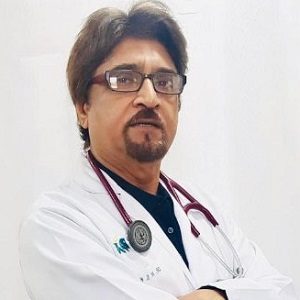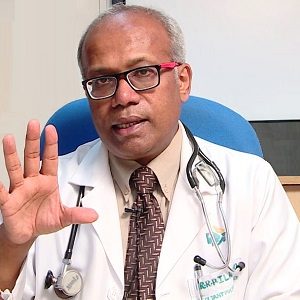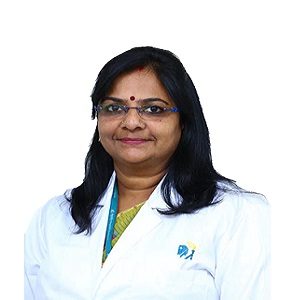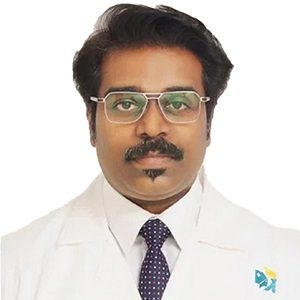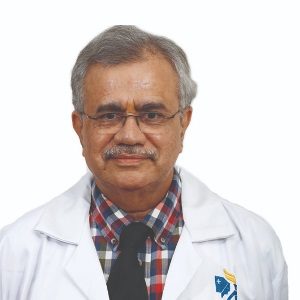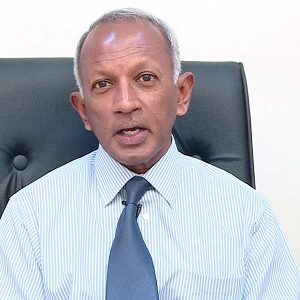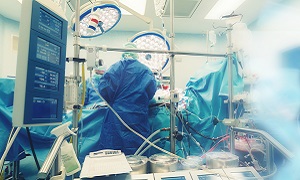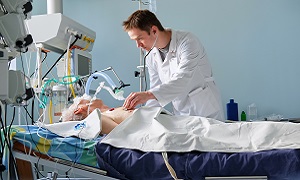Best Lung Transplant Surgeons in India
- Pulmonologist and Respiratory Medicine specialist, New Delhi, India
- Over 48 years’ experience
Profile Highlights:
- Dr. M S Kanwar is one of the best Pulmonologists and Respiratory Medicine specialists in Delhi, with an impressive 48 years of experience in the field.
- He practices as a Senior Consultant Tuberculous and chest Diseases Specialist and Pulmonologist at Indraprastha Apollo Hospital, New Delhi.
- Dr. Kanwar is an expert in Interstitial lung disease, Sleep Disturbance, Tuberculosis (TB), Sleep Study, Cystic fibrosis, Insomnia Treatment, and Obstructive Sleep Apnea Treatment.
- He was an integral part of CHEST – INDIA as an Editor.
- Pulmonologist and Respiratory Medicine Specialist, Chennai, India
- Over 33 years’ experience
Profile Highlights:
- Dr. Ilangho R P is one of the coveted pulmonologists in India from Chennai with about 33 years of experience in the field.
- He has achieved many prestigious positions in various national and international medical associations.
- His patients trust Dr. Ilangho for the most accurate diagnosis and the best care for respiratory diseases. He specializes in Decortication, Lung Surgery, and transplants.
- Pulmonologist and Respiratory Medicine Specialist, Chennai, India
- Over 25 years’ experience
Profile Highlights:
- Dr. Gayathri A R is one of the best pulmonologists in Chennai, with over 25 years of experience as a Respiratory Medicine Specialist.
- Dr. Gayathri has completed MBBS and MD from Tamil Nadu; and has a Fellowship from the College of Chest Physicians, USA.
- Dr. Gayathri was in the management of a Heart-Lung Transplant Recipient and holds membership in a couple of medical associations.
- She has published 20 papers and delivered 36 guest lectures to date.
- Pulmonologist, Chennai, India
- Over 7 years’ experience
Profile Highlights:
- Dr. Jebin Roger is a Pulmonologist from South India having 7 years of experience.
- He offers a range of services related to respiratory conditions that help patients in the diagnosis and treatment of their condition.
- He contributed research papers to many journals of National and International repute.
- Dr. Roger also contributed as a faculty and Coordinator for Diploma in Allergy and Asthma at CMC.
- Pulmonologist, Chennai, India
- Over 36 years’ experience
Profile Highlights:
- Dr. Narasimhan R is a well-known Interventional Pulmonologist of India serving for nearly 36 years in the field.
- He has performed more than 20000 investigative bronchoscopies, the highest ever in South India.
- Dr. Narasimhan is also a regular writer in The Hindu, an Editor for a couple of medical periodicals, and held several prestigious positions.
- Pulmonologist, Chennai, India
- Over 40 years’ experience
Profile Highlights:
- Dr. Raj B Singh is a renowned Internal Medicine specialist having a significant experience of 40 years in this field.
- In his career, Dr. Singh treated Respiratory Tract infections and Bronchitis. He also offers Mediastinoscopy, Pulmonary Function Test, Tracheostomy, Pneumonectomy, and Decortication.
- Dr. Singh has published 32 write-ups in Indian & International periodicals, magazines, and conference papers.
Best Lung Transplant Hospitals in India
Paras Hospital, Gurugram
- City: Gurugram, India
Hospital Highlights:
- Paras hospital was established in 2006 and is the 250 bedded flagship hospital of Paras Healthcare.
- The is supported by a team of doctors of international and national repute.
- The hospital is NABH accredited and also the first hospital in the region to have a NABL accredited laboratory.
- The hospital provides specialty medical services in around 55 departments including Neurosciences, Joint Replacement, Mother & Child Care, Minimal Invasive Surgery, Gynecology and Obstetrics, Ophthalmology, Dermatology, Endocrinology, Rheumatology, Cosmetic and Plastic surgery.
- The hospital is equipped with state-of-the-art technologies.
S L Raheja Hospital, Mahim, Mumbai
- City: Mumbai, India
Hospital Highlights:
- SL Raheja hospital is a 140-bed multi-specialty tertiary care hospital that is being managed by Fortis Healthcare Ltd.
- The hospital is a benchmark in healthcare and medical facilities in the neighborhood of Mahim & the western suburbs.
- L.Raheja Hospital, Mahim has one of the most effective ICU and Casualty care services.
- The hospital provides specialty medical services in Cardiology, Oncology, Neurology, Orthopedics, Mother & Child Care, and in Diabetes.
Wockhardt Hospitals, Mumbai
- City: Mumbai, India
Hospital Highlights:
- Wockhardt Hospitals were established in the year 1973, originally called First Hospitals and Heart Institute.
- Wockhardt Hospitals are super specialty health care networks in India, nurtured by Wockhardt Ltd, India’s 5th largest Pharmaceutical and Healthcare company.
- Wockhardt Hospitals is associated with Partners Harvard Medical International, an international arm of Harvard Medical School, USA.
- Wockhardt Heart Hospital performed India’s first endoscopic heart surgery.
- The hospital has a state-of-the-art infrastructure equipped with the latest technologies and modern equipment.
- It has special Centers of Excellence dedicated to the major specialties to provide hassle-free and high-quality clinical care.
Pushpawati Singhania Hospital & Research Institute, New Delhi
- City: New Delhi, India
Hospital Highlights:
- Established in 1996, Pushpawati Singhania Research Institute is one of the top hospitals in the NCR region, as well as one of the top facilities in India for gastroenterology. The hospital is one of South Asia’s first institutes in medical and surgical treatment for diseases related to digestion.
- The hospital is equipped with state-of-the art facilities coupled with the latest equipment as well as renowned consultants from various parts of India as well as other parts of the world.
W Pratiksha Hospital, Gurgaon
- City: Gurugram, India
Hospital Highlights:
- W Pratiksha Hospital, Gurugram, is one of the best hospitals in the NCR region. It is also a top hospital in India for IVF. Since its inception, the hospital has performed over 5500 successful IVFs. The hospital also specializes in gynecology.
- With over 20 years of experience in providing quality healthcare, the hospital is known as one of the most trusted and valued health providers in India.
- Equipped with world-class medical facilities and advanced technology, the hospital’s doctors and clinicians also have a track record of delivering excellent results. The hospital is also known for focusing on preventive well-being as much as on curative treatment.
- The hospital has earned the trust of its patients, by providing the best available treatments at affordable costs.
Narayana Superspeciality Hospital, Gurugram
- City: Gurugram, India
Hospital Highlights:
- Situated near DLF Cyber City, Gurugram, Narayana Superspecialty Hospital is one of the top medical facilities in the Delhi NCR region, catering to the needs of the people. Known for its commitment to quality medical care and patient service, the hospital is a state-of-the-art facility with planned and well-equipped sections, which includes a spacious OPD area as well as comfortable patient rooms.
- It is the closest super-specialty hospital from Indira Gandhi International Airport towards Gurugram, and also the nearest super specialty hospital from DLF Cyber City. It is also close to major residential areas in Gurugram.
- It is part of the renowned Narayana Health Group. Established in 2000, by Dr. Devi Shetty, a renowned cardiac surgeon, it has grown to be one fo India’s leading healthcare groups.
Sir Ganga Ram Hospital, New Delhi
- City: New Delhi, India
Hospital Highlights:
- Sir Ganga Ram Hospital, New Delhi is known to provide the latest medical procedures with the latest technology in all of its units.
- The hospital has a team of reputed doctors, nurses, and healthcare professionals that ensure that patients receive quality care at affordable costs.
- Staffed with a team of highly qualified doctors, dedicated nurses, and paramedical and non-medical staff, the hospital aims to lead in healthcare delivery, medical education, training, and research.
- As per the vision of the founder, the hospital also provides free treatment to the economically weaker sections of society.
- Sir Ganga Ram Hospital also provides training to young doctors under the Diplomate in National Board(DNB) program. The DNB program at the hospital was started in 1984 and it is known for currently running the maximum number of DNB specialties in the country. It also has the distinction of having the first bone bank in India.
KIMS Hospital, Hyderabad
- City: Hyderabad, India
Hospital Highlights:
- KIMS Hospital (a brand name of Krishna Institute of Medical Sciences) is one of the largest and best multi-speciality hospitals in Hyderabad. The hospital provides various treatments to an enormous number of patients.
- The hospital has a capacity of more than 3000 beds. KIMS Hospitals offers different healthcare services in more than 25 specialities and super specialities.
- The hospital is equipped with modern medical equipment and technology. It has robotic equipment to provide minimal invasive techniques for patients.
- The hospital is aimed at providing world-class healthcare facilities and services at an affordable cost for patients.
- The various specialities and departments of the hospital include neurosciences, gastroenterology & hepatology, robotic science, reproductive sciences, dental science, oncological sciences, organ transplantation, heart and lung transplantation and mother and child care.
Fortis Hospital, Shalimar Bagh
- City: New Delhi, India
Hospital Highlights:
- Fortis Hospital in Shalimar Bagh is a multi-super specialty hospital that strives to provide world-class patient care by leaving no stone unturned.
- Fortis, Shalimar Bagh, with 262 beds and a 7.34-acre footprint, provides the best level of medical care through its team of doctors, nurses, technicians, and management professionals.
Reliance Hospital, Mumbai
- City: Mumbai, India
Hospital Highlights:
- Reliance Hospital is one of the best super-specialty care hospitals in Navi Mumbai.
- The main purpose of this hospital is to become a trustworthy place for the best health and hope for society. The hospital is well connected to the suburbs of Mumbai and Navi Mumbai.
- The hospital has various specialty departments, viz., Accident & Emergency, Anesthesiology, Dental Services, Dermatology, Diabetology, Dietetics Nutrition, Endocrinology, ENT, Gastroenterology, General Surgery, Gynaecology And Obstetrics, Hepato Pancreato Biliary Surgery, Infectious Disease, Internal Medicine, Interventional Radiology, Laboratory Medicine, Minimal Access Laparoscopic Surgery, Nephrology, Neurosciences, Opthalmology, Orthopaedics, Paediatrics, Pain Management Palliative Care, Physical Medicine Rehabilitation, Plastic And Reconstructive Surgery, Psychiatry, Pulmonary Medicine, Radiology, Rheumatology, Transplant, Urology Andrology, Vascular Surgery
Lung Transplant
Lung transplant is an effective treatment for people with severe lung disease, where a diseased or failing lung is replaced with a healthy lung, usually from a deceased donor. This treatment option is reserved for people who have tried multiple other treatments but failed to see any significant improvements.
Depending on the patient’s condition, a lung transplant can involve replacing one of the lungs or both of them. Sometimes, the lungs are transplanted along with a donor’s heart. Even though a lung transplant can involve several complications, it generally improves one’s health and quality of life.
Purpose
Unhealthy or damaged lungs can make it difficult for one to get the required amount of oxygen. The lung’s function can be affected due to a variety of diseases and conditions; some of the most common ones including:
- Chronic obstructive pulmonary disease including emphysema
- High blood pressure in the lungs (pulmonary hypertension)
- Scarring of the lungs
- Cystic fibrosis
Even though lung damage is usually treatable with medication or special breathing devices, when these measures are no longer able to help or the lung function reaches a life-threatening condition, a lung transplant might be suggested by your doctor.
People who are suffering from coronary artery disease might need a procedure for restoring blood flow to a blocked or narrowed artery in the heart, along with a lung transplant. In some cases, people having serious heart and lung conditions might need a combined heart-lung transplant.
However, it is also noteworthy that a lung transplant is not the right treatment for everyone. Certain factors can sometimes mean that you are not a proper candidate for the transplant. It might not be the proper treatment if you
- Have an active infection
- Have serious diseases including kidney, liver, or heart diseases
- Have a recent personal medical history of cancer
- Are unwilling or unable to make the necessary lifestyle changes necessary to keep your donor lung healthy, which includes avoiding alcohol and smoking
- Do not have a network of supportive friends and family
Preparation
Preparations for a lung transplant usually begin a long time before the transplant. Sometimes you might need to prepare for a lung transplant weeks, months or even years depending upon the waiting time for your transplant.
If your doctor recommends a transplant, you will be referred to a transplant center for your evaluation. You are free to select a transplant center of your choice as well. When you are evaluating a lung transplant center, do keep in mind to:
- Check with your health insurance provider to know which transplant centers are covered by your insurance plan
- Look at the number of lung transplants the center performs each year as well as the survival rates of the recipients.
- Consider additional services that your transplant center provides, such as travel arrangements, support groups, help to find local housing for your recovery period, etc.
Once you have made up your mind to have your lung transplant, you will need an evaluation in order to see if you are eligible for the transplant. During an evaluation, your medical history will be reviewed by your doctors and transplant team and a physical examination will also be conducted. A physical examination along with several other tests will also be required in order to evaluate your mental and emotional health.
The benefits and risks of the transplant will also be discussed by your transplant team as well as what you should expect before, during and after your transplant. Your name will be registered as well as placed on the waiting list, once you are determined eligible for the transplant.
If the transplant team determines you as a candidate for a lung transplant, your name will be registered and placed on a waiting list. Since the number of people who need lung transplants exceed the number of donated lungs available, unfortunately, some people die while they wait for their transplant.
While you are on the waiting list, your medical team will be closely monitoring your condition as well as alter your treatment as needed. Your doctor might also recommend healthy lifestyle changes, which include eating a healthy diet, getting exercise on a regular basis and avoiding tobacco.
Your doctor might also recommend you take part in a pulmonary rehabilitation program while you are waiting for the donor’s lung, as this can help in improving your health as well as your ability to function in daily life before and after the transplant.
As soon as a donor organ is available, the donor-recipient matching system administered by the United Network for Organ Sharing will find an appropriate match based on specific criteria, which includes:
- Blood type
- Size of organ compared with the chest cavity
- How severe the recipient’s condition is
- Geographic distance between the donor organ and transplant recipient
- Likelihood that the transplant will be successful
- Overall health of the recipient
Even though it can take months or even years before a suitable donor is available, you should be prepared at all times. Make sure that your transplant team is able to reach you at all times.
Keep your hospital bag packed and remember to include a 24 hour supply of your medications. Also arrange transportation to the center in advance, as when the organ is available, they will be expecting your arrival in just a few hours.
After you arrive, you will need to undergo tests in order to make sure that the lung is a good match, and you are healthy enough for surgery. The donor’s lung needs to be healthy as well, or else it will be declined by the team. If it doesn’t seem like the transplant will be a success, it might be cancelled.
Procedure
You will receive general anesthesia before the procedure and therefore, you will be unaware throughout the process and won’t feel any pain. You will get a tube that will be guided through your mouth and into your windpipe so that you are able to breathe.
First, your surgeon will be making a cut in your chest for removing your diseased lung. The main airway to that lung as well as the blood vessels between that lung and your heart will next be connected to the lung of the donor. In some transplants, you might be connected to a heart-lung bypass machine, which will circulate your blood throughout the procedure.
After the transplant
A tube in a vein will deliver strong medications for controlling pain and to prevent rejection of your new lung. As your condition improves, you will not need a mechanical ventilator anymore and you will be moved out of the ICU as well. Recovery can involve a one-to-three week hospital stay and the amount of time you will spend in the ICU and in the hospital may vary.
Once you leave your hospital, you will require around three months of frequent monitoring by the lung transplant team for preventing, detecting and treating complications as well as for assessing your lung function. You need to stay close to the transplant center and over time, your follow-up tests can get less frequent.
Few important things you need to include your routine include:
- Education sessions so that you can learn your complicated new lifelong medication plan.
- Frequent visits to your doctor.
- Regular tests of lung function, chest X-rays, blood tests as well as procedures like bronchoscopy
Many transplant centers offer temporary housing nearby so that it becomes easier for their patients to make visits easily and frequently.
A lung transplant can help one to remove breathlessness and live an active and healthy life for years. 4 out of 5 people who have had lung transplant surgery, has reported to have no limitations on their physical activity.
However, complications after the transplant may eventually arise. The immune system’s rejection of the donor’s lung can be slowed, though it can’t be stopped entirely. The necessary powerful immune-suppressing drugs have some side effects which are unavoidable. These may include kidney damage, diabetes, etc. Survival after transplant is mostly influenced by age.
Risks
In a few cases, complications which are associated with a lung transplant can be serious and sometimes fatal. Rejection and infection are known to be the most common risks.
Risk of rejection: Your immune system is meant to defend your body against any foreign substances. Even if there is a match between you and your donor, your immune system will attempt to attack and reject your lung or lungs. The risk of rejection is highest soon after the lung transplant and over time it reduces.
You will need drugs to suppress the immune system to prevent rejection of your new organ. You might need to use these anti-rejection drugs for as long as you live.
Anti-rejection drugs can have some noticeable side effects, which will include weight gain, stomach problems and facial hair.
Sometimes anti-rejection medications can even increase your risk of developing new conditions or even worsen your existing conditions, such as diabetes, cancer, kidney damage, osteoporosis and high blood pressure.
Risk of infection: Since the anti-rejection drugs suppress your immune system, this can make your body more susceptible to infections, especially in your lungs.
Washing your hands regularly, and avoiding large crowds as well as people who might be ill are some of the steps one can take to avoid any kind of infection.

